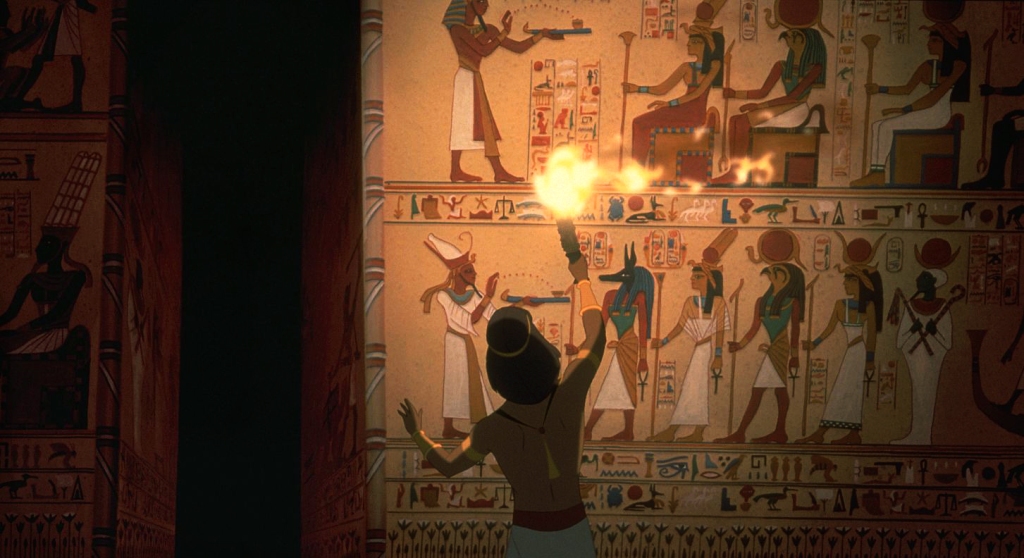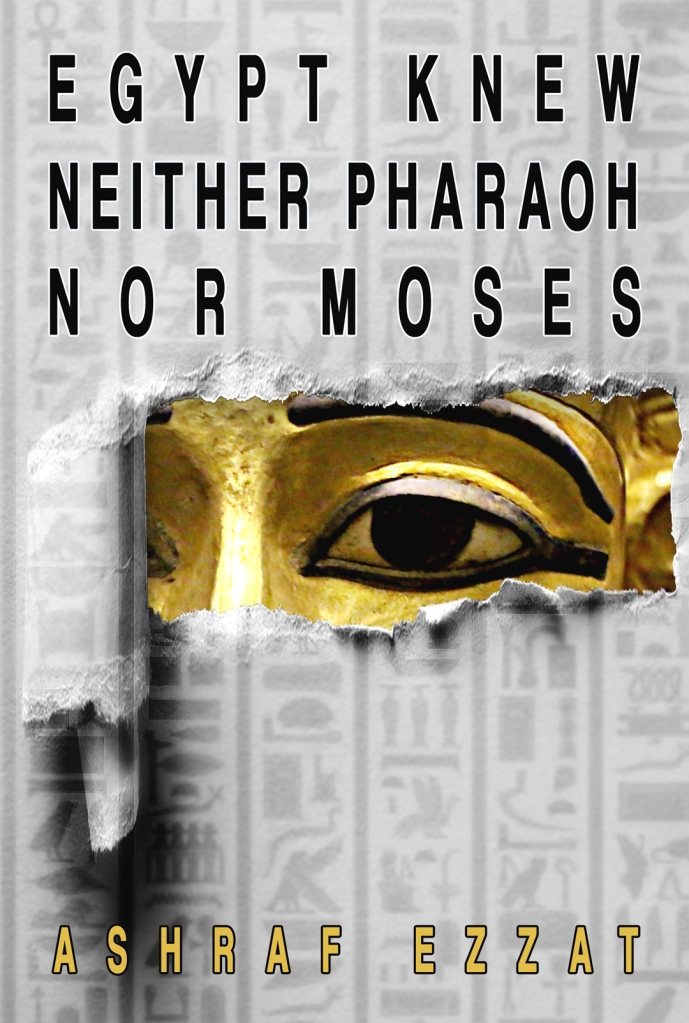“The original text of the Exodus story is written in ancient Hebrew and it tells a different story”

By Ashraf Ezzat
“I have been wanting to visit Egypt for so long … especially ever since I have watched the “The Prince of Egypt” film … you know that animated Hollywood film about the story of Moses & Pharaoh” said one excited American tourist whom I accidentally met inside the Temple of Karnak in Luxor, Egypt.
Excited she was indeed. Why not, after all her dream came true. She was on the ancient land that witnessed the biggest stories of the Bible, the story of the Exodus.
Most of the tourists who visit Egypt, and they are millions each year, come to the land of the Pyramids with that story of Pharaoh & Moses lurking in the back of their minds. This infamous story is like the backdrop for everything they see, and maybe the main reason why they wanted to visit Egypt in the first place.
But the big surprise, or maybe shock, for most of the western tourists (and non-western for that matter), is that the land that fascinates them with its temples, pyramids, and mummies is not biblical Egypt.
All the Israelite stories in the Bible and even in the Qur’an like the story of Abraham, Joseph, and of course Moses, if happened at all, did not take place in the ancient land of Egypt.
Not only the tourists but also western archeologists came to the land of the River Nile for they believed it is biblical Egypt. But unfortunately for them, it turned out it is not.
Almost two centuries of digging all over the land of Egypt but all archeological excavations have so far come up empty-handed. Modern archeologists haven’t been able to find any shred of historical evidence to corroborate the story of the Exodus took place in ancient Egypt. The land of Egypt won’t give them what they came looking for.
“And the Egyptians will know that I am the Lord when I stretch out my hand against Egypt and bring the Israelites out of it” Exodus 7:5
A nice verse from the book of Exodus. Nice and obvious enough to convince the faithful readers that the story of Moses & Pharaoh happened in ancient Egypt.
But it is fair to say that the above verse is as nice and obvious as long as it is read and interpreted in its English translation. But actually, the original text of this story is written in ancient Hebrew. Moreover, it tells a different story.
In its ancient Hebrew version, the verse doesn’t mention “the Lord” but rather a strange name called, Yahweh, and furthermore, it doesn’t mention Egypt as well, but rather a similarly strange word called “Mizrayim”
“Yahweh” could be interpreted as one of the names of the ancient Israelites’ god, for he has other names in the Torah like Hashem and Elohim. Or were they names for multiple gods? It is a plausible thought, especially after archeologists have discovered lately that Yahweh had a female consort called, Asherah.
Contrary to the mainstream perception, Judaism, or rather the early tales & practices of the Israelite tribe started as a pagan cult revering many tribal gods like Hashem, Yahweh, and Elohim.
Very strange names that sound very foreign to the ears of westerners (Europeans, Australians, and Americans). But not to the eras of people coming from the land of the ancient Near East, or what we now refer to as the Middle East. For simply Hashem and Elohim (Allah in Islam) are genuinely Arabian names. Some will object and say “if Hashem, Yahweh, and Elohim are ancient Hebrew names how could you refer to them as Arabian?”
First of all, I want to draw your attention to the fact that ancient Hebrew is one of the dialects of the ancient Arabian tongue, just like the Samaritan, the Sabaean (ancient Yemenite), and the Aramaic. I usually refer to the above dialects as ancient Arabian and I decline to refer to them as Semitic (for this classification is debatable as it is more biblical than scientific)
So after this premise, you might be tempted to jump to the mainstream conviction that “Mizrayim” is but the Hebrew name for ancient Egypt. But once again I will disappoint you and tell you that it is not.
The ancient Greeks were the first ones to apply the name Αἴγυπτος (Aígyptos) to the entire land of Egypt. Therefore, the present-day meaning of the name Egypt in English can be attributed to the ancient Greeks. Some scholars of Egyptology claim that it was called Hikuptah and sometimes Kemet, but the native name for ancient Egypt was (Coptos) … and it was known in the ancient world as the land of Copt till the end of late antiquity when it was conquered by the Arab Muslims.
“17And should any of the tribes of the earth not go up to Jerusalem to worship the King, the LORD of Hosts, then the rain will not fall on them. 18And if the tribe of Mizrayim (Egypt) will not go up and enter in, then the rain will not fall on them; this will be the plague with which the LORD strikes the nations who do not go up to celebrate the Feast of Tabernacles. 19This will be the punishment of Mizrayim and of all the tribes that do not go up to celebrate the Feast of Tabernacles” Zechariah 14: 17-18
Now, Zechariah is specific about dating his writing (520–518 BC) since his prophecies took place during the reign of Darius the Great.
We obviously have a problem of historical anachronism here. If we went along and accepted the alleged concept that Mizrayim is the Hebrew name for ancient Egypt we will find ourselves in a historical dilemma that defies the logic of the Bible itself.
The whole book of Exodus that was supposedly written around 800 years before the book of Zachariah is all about delivering the Israelites out of Egypt (Mizrayim). For Egypt (Mizrayim) in the story of the Exodus is depicted as the land of idolatry, tyranny, and slavery. And flee Egypt they did as the Israelites ran off to kill the Canaanites and grab their land ( supposedly flowing with milk & honey)
So, if the Israelites’ god managed to deliver them out of Egypt after they had begged Pharaoh countless times to let them go, then it would become obvious that going back to this land, called Mizrayim in the Hebrew Bible, should be prohibited.
In other words, the Israelites, and later on the Jews, based on the sacredness of the book of the Exodus should not be allowed to enter the land of Egypt (Mizrayim) once again after they had miraculously fled out of it. Neither could we by any stretch of logic view Egypt (Mizrayim) as one of the Israelites tribes as written in the book of Zachariah.
Ancient Egypt was a superpower in the ancient world and referring to the Egyptian empire as a tribe is completely unacceptable and leaves us with two options; either the author of the book of Zachariah is mistaken or that “Mizrayim” in his account refers to some tribal land far from the “ancient Egyptian empire” we all know.
So, in the book of Zachariah, a genuinely Arabian name by the way, we encounter a peculiar situation. We find the god of the Israelites refers to Egypt as the tribe of Mizrayim, and if that is not enough he goes on and threatens the Egyptians with lack of rain if they did not join other Israelite tribes and went up to celebrate the feast of tabernacles.
That once again leads us to view the “Mizrayim” mentioned in the book of Zachariah, and consequently in every other mention in the Hebrew Bible as some small tribal land that somehow followed the Israelite cult and therefore should perform the Israelite rituals including celebrating “the feast of tabernacles”.
One more point worth mentioning here is that it seems that the tribe of Mizrayim lived in some nomadic land in the desert that mainly depended on rain for its herding & farming, while ancient Egypt was a kingdom that relied primarily on the River Nile, and not the rain, for farming its vast lands and maintaining its agricultural economics.
Since the names of the Israelite gods (Yahweh, Hashem, and Elohim) are Arabian in origin, not to mention that the name “ Zachariah” is undoubtedly Arabian as well, we could conclude that “Mizrayim” mentioned in the Hebrew Bible is not meant by any means to refer to ancient Egypt, but rather to some small nomadic tribe located somewhere in ancient Arabia. And by ancient Arabia, we mean the south of Arabia and Yemen…
For more on the Arabian origin of the Israelite stories and their geography read Ashraf Ezzat’s book “Egypt Knew neither Pharaoh nor Moses“
 RSS Feed
RSS Feed















 November 8th, 2021
November 8th, 2021  Awake Goy
Awake Goy 

 Posted in
Posted in  Tags:
Tags: 













